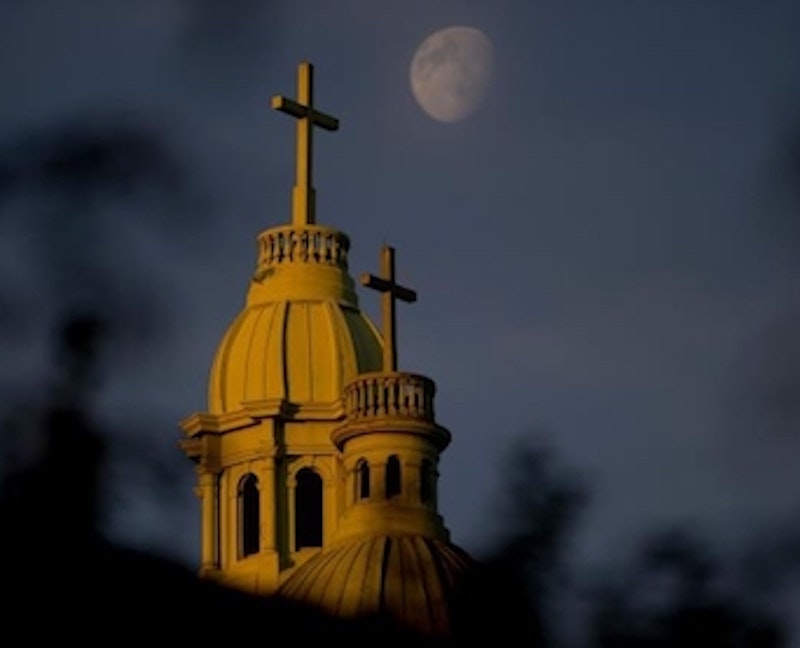A grand jury in Pennsylvania just issued a report describing child sexual abuse by hundreds of priests, likely with thousands of victims, and the accompanying systematic institutional cover-up. And the former Archbishop of Washington, Theodore McCarrick, resigned last month after having been accused, plausibly, of abusing children for decades.
I’m going to engage in historical speculation without sufficient research. But then again, the history of child sexual abuse in the Roman Catholic Church is liable to be somewhat difficult to research. It controls its own records, and—to begin the speculation—has dedicated itself for millennia to (a) helping the poor and downtrodden, (b) building and ornamenting grand buildings, and (c) concealing the millennia-long central sexual practice and orientation of the Church.
When people try to explain the record of remarkably persistent and pervasive sex abuse around the world perpetrated by the Catholic priesthood, they often focus on factors peculiar to the last century or so: the details of 20th-century seminary training, for example. I suspect, however, that boy-oriented pederasty goes back to the origins of the Catholic Church and its "fathers."
The first factor I’d mention is misogyny, and the basic justification of clerical celibacy, as it developed over the centuries, is not that sex is sinful or distracting or whatever it may be, but that women are polluted. In the view of many Church fathers, women brought sin into the world, and touching a woman is touching Satan, more or less. Here is how Tertullian (155-240 A.D.) addressed women, for example:
You are the devil’s gateway; you are she who first violated the forbidden tree and broke the law of God. It was you who coaxed your way around him whom the devil had not the force to attack. With what ease you shattered that image of God: Man! Because of the death you merited, even the Son of God had to die... Woman, you are the gate to hell.
But of course, for a man, avoiding women at all costs doesn’t actually entail never having sex. I think that, from early on, the vow was not one of celibacy, but of gynophobia and a consequent resolution to stick to boys, though perhaps that's not how they presented it at the time to anyone other than their own seminarians. Or we might say that, as they trained thousands of young men for the priesthood, they were realistic. Look, we can't really expect these people never to have sex again. But they can definitely avoid having sex with women, which is actually the essence and origin of sin, a recapitulation of the Fall of Man. For each parish, a supply of altar boys (who are also possible future priests, after their sexual initiation).
And let me also speculate that this atmosphere, as well as the alleged vow of celibacy itself, attracted a large percentage of the gay men of Europe for over a thousand years. Let's say you were a young man attracted to men, being raised in a Christian household and listening, for example, to Leviticus: "If a man lies with a man, both of them have committed an abomination; they shall surely be put to death." One possible reaction is profound shame. You might be desperate to get your sexuality under control, or even to erase it entirely (the extreme version would be self-castration, not unheard of). You might think that you could only be saved by celibacy. Once you got into the institution, you might realize that the whole thing was a bit of a gay smorgasbord. But then again, everyone in town, including you, sort of knew that in anyway in the back of their heads.
I don't assume that any Catholic priest I meet is a child abuser. But I do assume he's gay. Don't you? Obviously, in many cases one would be wrong about that. But not in as many cases as those in which one would be right, I feel. That could have been a positive thing. The Church has provided a place of shelter for generations of gay men, like a community center in the 1980s. Obviously, there's no reason that gay men can't be highly spiritual, highly sincere, and relatively sexually continent. But one problem here is that though this was more or less what the Church was, it was attempting to conceal the whole thing while maintaining a public stance against homosexuality. That shame and dishonesty has been deeply harmful to the priests, to the parishioners, and certainly to the abused children.
Child sexual abuse, specifically of boys, might be more or less as central to the history and practice of the Roman Catholic Church as the use of holy water or communion. It might be what the Catholic Church has basically been for. As the church struggles yet again with hundreds of priests and thousands of victims, one possible reform it might consider is to disband. If it's going to persist and be of net benefit to the world, however, it's going to need to rethink its own sexuality and shame to the extent that will make it possible to acknowledge its history.
What made it possible and so destructive was the self-loathing and consequent self-concealment at its heart. The pervasive dishonesty about the identity of the institution and the people in it form an enduring and perhaps impassable barrier between the Catholic Church and its God.
—Follow Crispin Sartwell on Twitter: @CrispinSartwell

